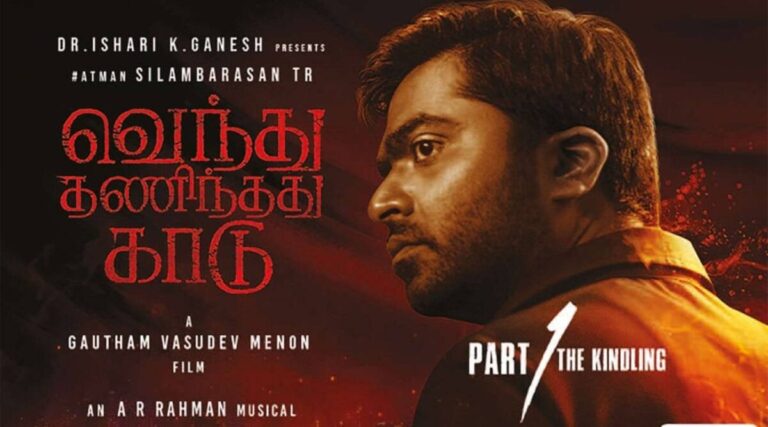Vendhu Thanindhathu Kaadu Movie Synopsis: A youngster from Tamil Nadu goes to Bombay in search of a better life and gets sucked into the underworld. Will he be able to find a way out of the violence and bloodshed?
Vendhu Thanindhathu Kaadu Movie Review: Muthuveeran (a terrific Silambarasan TR, who effortlessly captures the unease that a small-town guy feels in the big, bad city), the protagonist of Vendhu Thanindhathu Kaadu, is someone who is used to life dealing him a bad hand. We sense this very early into the film when we see him barely making an escape from a wildfire. His is a life of thorns, quite literally, so when he is faced with the question of survival, he is ready to do whatever it takes — including getting mixed up with the underworld — to provide a better life for his mother Latchuhmi (Radikaa Sarathkumar) and sister Gomathi (Angelina). He gets to know of the danger this life poses even before he steps into this world, when he witnesses the death of his relative.
And so, this youngster from Karuvakkulam goes to Bombay to work in a parotta shop that is a front for gangster Karjee (Sara, who never comes across as a heavyweight gangster). Soon enough, Muthu is caught up in the rivalry between Karjee and Kutty Krishnan Nair (Siddique). Can he find a way out of this vortex that is pulling him deep into violence and murder — especially after falling in love with Paavai (debutante Siddhi Idnani, who seems confident in some scenes and tentative in some)?
With Vendhu Thanindhathu Kaadu, Gautham Vasudev Menon attempts a gangster saga that takes us deep into the underworld, where those driven by desperation are used as pawns (“periya machine-la chinna screw,” as a character describes them) by their bosses in their game of one-upmanship. The filmmaker presents an unvarnished look at this world that involves exploited lives, unfulfilled dreams and constant danger. The first time we see the parotta shop, he frames it like a prison, visually signalling what Muthu is getting into. While Muthu’s descent (or ascent, if you choose to see it that way) in this world is a somewhat familiar arc, Gautham makes these scenes engaging by drip-feeding us the workings of the gang. We know that Muthu, whose mother has sent him in the hope of preventing him from commiting murder — which, she believes, is his destiny — will make use of the gun that comes into his hand in the earlier scenes, but the manner in which the filmmaker reaches this point feels fresh. Thamarai’s lines for AR Rahman’s majestic Marakkuma Nenjam — Engu thodangi/ Engu mudiyum/ Aattrin payanam — keep echoing at key moments, superbly underlining the conceit of the story.
We get a counterpoint to Muthu in the form of Sreedharan (Neeraj Madhav), a Malayali, who lands up in Bombay at the same time as the former and becomes part of Kutty’s gang. Gautham shows how there is hope for someone who chooses to get away from this world. In fact, even Muthu gets a similar chance, which he is initially shown to be taking.
But it is in giving us what happens to Muthu next that the film slips. The problem is that the secondary characters are not fleshed out in detail. We get to know very little about Karjee and Kutty apart from the fact that they have someone even more powerful above them calling the shots and that both have a weakness for women. Even the romantic track — a strong point of this filmmaker — feels underwhelming. You see Gautham making an attempt to move away from his usual formula both in terms of content (character-driven rather than plot-driven) and form (lengthy shots, no voice-over), but the understated, more realistic approach in much of the scenes goes against the filmi (in the portions involving a contract killer, played by Jaffer Sadiq, who gets a role somewhat similar to what he did in Vikram) and heroic moments (the epilogue) that we find in the latter half. The screenplay is co-written by Jeyamohan along with the director, and it feels like the two of them wanted to go in opposite directions.
This is especially felt in the epilogue — a lead to a possible sequel — that lessens the impact of the more effective low-key ending. Rather than coming across as something organic, this sequence, which even includes a hat tip to one of Tamil cinema’s iconic gangster dramas, only feels like pandering to the fans.





